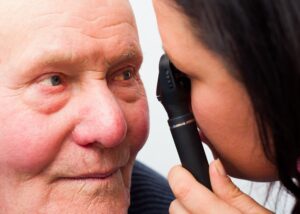
The easy answer to the question, “Is your loved one at risk for cataracts?” is yes. More than 50% of elderly individuals over the age of 80 develop a cataract or two. A cataract is a cloudy area that forms in the lens of the eye. It can cause the person who has one to struggle with reading because vision becomes blurry and hazy.
The symptoms don’t usually happen at first and sometimes come on so slowly, many individuals will think it’s just their eyes getting worse as they age. They might make allowances for it, by increasing the print size on the screen or having someone like a personal care at home provider help with reading recipes or even a book.
Some of the first symptoms that people notice are the following:
- A halo will appear around lights, especially at night.
- Lights will also often seem too bright. Lamps, headlights, and even bright sunlight can cause pain and squinting that seem above how most people react to the light. Your loved one’s companion care at home provider may notice your loved one seems to enjoy sitting in darker rooms or keeps her sunglasses on even once inside.
- The world loses its definition. With a cataract, your loved one’s sight becomes cloudy and hazy, and colors lose their vibrancy. The flowers aren’t as bright as before and the trees in the distance become fuzzy and hard to focus on.
- Night sight becomes very difficult and your loved one may not want to drive at night anymore and needs the help of her companion care at home provider to help her get anywhere after the sun sets.
As mentioned earlier, the risks are high for those over 80 to develop a cataract in their lives. But other factors can also add to the risk that age alone already presents. Increased risk occurs with all of these:
- A smoking habit.
- A previous eye injury or surgery.
- Spending too much time in the sun without adequate eye protection like sunglasses or a hat with a brim.
- Taking steroids for treatment of health issues like asthma or arthritis.
- Drinking excessive alcohol.
- Health issues like diabetes can also increase the risk.
If you’re worried that your loved one might have a cataract, a simple exam can help her discover if she has one or not. During her next eye appointment, the eye doctor will probably recommend a dilated eye exam. The eye doctor will put some eye drops into your loved one’s eyes to cause the pupils to dilate which will then allow him to check the eyes for cataracts or other eye problems. Just make sure your loved one has a ride home as it can be difficult to drive immediately following the procedure, especially on a bright, sunny day.
If a cataract is discovered, your loved one’s doctor will work with her to determine if she needs surgery soon or if it can wait. Many people live with cataracts so long as they don’t interfere with their being able to live life as they’d like.
If you or an aging loved-one is considering personal care at home in Beverly Hills, CA please contact the caring staff at Nu Care Inc. today at. 800-505-6890

